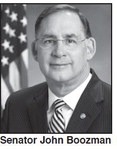Helping More Arkansans Access Higher Learning

From U.S. Senator John Boozman
Late last year, Congress took a historic, critical step toward expanding access to higher education and supporting the nation’s historically black colleges and universities (HBCUs) and minority- serving institutions (MSIs). In December, bipartisan legislation was approved and signed into law by President Trump that provides permanent funding for HBCUs while also reforming federal financial aid to make it easier and simpler for those who rely on it.
The Fostering Undergraduate Talent by Unlocking Resources for Education Act, or FUTURE Act, promises to help make college more accessible and invests in the institutions that serve populations that traditionally see less college participation than their counterparts. The bill does two specific things to serve these ambitions.
First, it provides permanent annual funding for HBCUs and MSIs and guarantees they will receive at least $250 million per year. That funding will come from savings to the federal government as a result of the law’s measure to allow the sharing of tax data between the IRS and Department of Education, which the Congressional Budget Office estimates will save $2.8 billion over ten years.
The FUTURE Act also makes the Free Application for Student Aid (FAFSA) form more user-friendly and shorter by allowing students to bypass up to 22 questions, as well as reduce duplicative and burdensome verification processes. These steps to ensure minority-serving institutions are well-positioned to continue providing quality educational opportunities into the future and help students better access tools and resources to pay for college are likely game-changers.
Arkansas is home to four HBCUs – the University of Arkansas at Pine Bluff, Philander Smith College, Arkansas Baptist College and Shorter College. I’ve met with administrators and faculty at these schools who have emphasized the need for consistent funding while also demonstrating their value to their communities and our state.
I recognize the historical significance and positive educational impact of these schools in Arkansas and across the country. They provide an immense source of pride and accomplishment not only for the African American community, but also for all Americans, which is why I strongly believed in the need to maintain structures for the opportunities they promised so many aspiring scholars.
As a former school board member in Rogers, I have consistently sought to ensure that Arkansans receive the very best education we can offer them.
The FUTURE Act was a commonsense, bipartisan success because of its clear objectives to support and sustain minority-serving higher learning institutions while also helping to make student aid easier to understand and apply for. In fact, it passed the Senate unanimously.
Providing students who want to go to college the opportunity to do so has helped transform our society. We have an obligation to make sure that students from diverse backgrounds have the same access to higher education and that the institutions specifically created to serve their unique needs are poised to improve and grow. That’s why the FUTURE Act is such an important achievement that we should celebrate in Arkansas and across the U.S.


